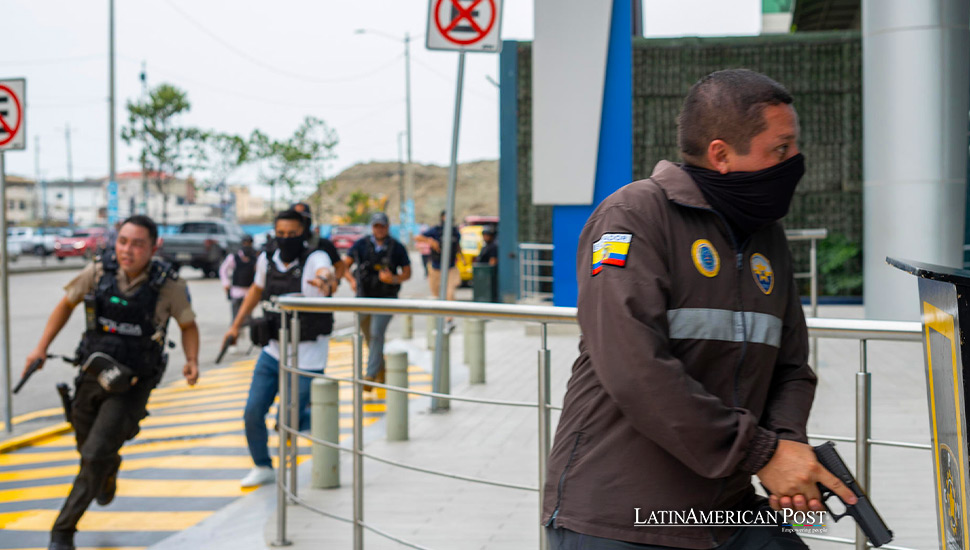Ecuador’s Bold Strategy Against Crime to Jump Start the Economy: A Blueprint for Latin America?

In Ecuador, President Daniel Noboa’s declaration of an “internal armed conflict” against criminal gangs has sparked a significant political shift, enabling economic reforms and a popular referendum amidst a wave of violence and insecurity.
A Bold Approach to Organized Crime
Under President Daniel Noboa, Ecuador has embarked on a bold journey, confronting the menace of organized crime head-on by declaring an “internal armed conflict.” This declaration, a first of its kind in the nation’s battle against drug trafficking and associated violence, has not only bolstered Noboa’s political standing but has also paved the way for economic reforms and the facilitation of a popular referendum with minimal opposition.
The first hundred days of Noboa’s administration, marked on March 1, have significantly improved public security perception. During this period, we witnessed one of the country’s most violent episodes as the government pursued the notorious drug trafficker José Adolfo Macías, alias ‘Fito.’ The violence escalated to unprecedented levels, including the kidnapping and murder of police officers, hostage situations in prisons, and a brazen attack on a live television broadcast by armed assailants.
Political Capital and Public Approval
Political analyst Cristian Carpio highlighted that Noboa’s strategies have provided a sense of security to the citizens amidst an otherwise tumultuous start. Even before assuming office, Noboa enjoyed a public approval rating above 60%, which has since soared to between 70% and 80%, according to various polls. This robust political capital has enabled Noboa to implement urgent economic legislation and navigate the political landscape more effectively than his predecessors.
Ecuador’s fight against crime has broader implications for Latin America, where many countries grapple with similar challenges. Nations like Colombia, Mexico, and Brazil have long been entangled in battles against drug cartels and organized crime. However, Ecuador’s unique approach, branding criminal gangs as terrorists and deploying measures typically reserved for armed conflicts, presents a new paradigm that could offer lessons to its neighbors.
In Colombia, for instance, the government has been fighting the Revolutionary Armed Forces of Colombia (FARC) and other armed groups for decades, with mixed results. Mexico’s war against drug cartels has led to widespread violence and instability. At the same time, Brazil faces ongoing battles in favelas against drug gangs. These countries, each with distinct contexts and challenges, could observe Ecuador’s strategy as a case study in leveraging political will and security measures against organized crime.
Security Measures and Economic Reforms
Noboa’s government has focused on more than just security. Still, it has also pushed forward with economic reforms, such as raising the Value Added Tax (V.A.T.) from 12% to 15% to bolster state finances for combating insecurity. Additionally, the administration has ratified free trade agreements with China, underscoring the government’s ability to pursue broad policy objectives amidst a security crisis.
The upcoming referendum, set for April 21, will be a critical test of Noboa’s continued support from the Ecuadorian populace. The referendum includes questions on security and the extradition of Ecuadorians, reflecting the administration’s commitment to tackling the roots of insecurity and crime.
Balancing Act for Ecuador’s Future
As Noboa’s administration moves forward, the challenge will be to maintain public support while addressing the economic impacts of its policies. The balance between security improvements and financial stability will be crucial for Ecuador’s future and as a model for other Latin American countries facing similar dilemmas.
Also read: Ecuador Withdraws from Arms Deal with US to Avoid Involvement in Ukraine Conflict
Ecuador’s journey offers a compelling narrative of resilience and strategic governance in the face of adversity. As Latin America watches, the continent may find valuable lessons in Ecuador’s fight against organized crime, potentially shaping regional strategies for years.





